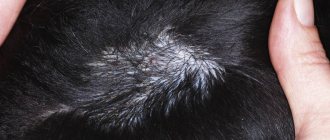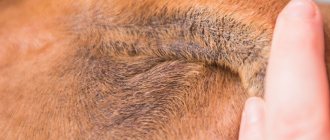Pours of juicy berries with thin skin and a sweet sugary aroma. We have known about the benefits of grapes since ancient times and, it would seem, do not even think about the possible harm of the fruit to our smaller brothers.
Each berry carries taste and benefits for human health. In theory, grapes are a great addition to a dog's main diet... but are they?
Is it possible to give grapes to a dog?
Many dog owners use grapes as a reward for good behavior. The format of the treat is convenient: each berry is “packed” in a peel. But do they think about the benefits of such a treat?
Positive reinforcement training is a great way to raise your best friend. By rewarding your pet with a toy or treat for good work, you motivate him to study harder to earn the reward. When caring for your four-legged friend, you must be sure that the treat will not harm your pet’s health.
Unfortunately, no matter how tasty and healthy a treat grapes or dried raisins are, they are contraindicated for dogs, as they can cause kidney failure.
Let's take a closer look
Grapes: where the danger lies
This fruit-bearing vine produces a harvest of delicious, juicy berries. There is both a cultivated plant of this species and a wild one. Cultivated grapes are not only edible for people, but also very useful. Its fruits are consumed fresh, dried, canned, dried, and oil is made from the seeds. In addition, the production of wines and balms, which are made from grapes, is well developed.
At first glance, it may seem that you can treat your beloved pet to this juicy delicacy, especially if the dog loves sweets and will not refuse a couple of delicious berries. However, veterinarians classify both grapes and their dried version, raisins, as the most toxic natural foods for dogs! And it doesn’t matter whether the fruits are grown on an environmentally friendly plantation, without the use of artificial fertilizers, or in a city with emissions and gas pollution - they are poisonous in any case.
Not immediately, but doctors still managed to find out in 1989 that the development of acute kidney failure in dogs is associated with the consumption of grapes or raisins by the animal. And since then, scientists have been trying to figure out why this product provokes intoxication in the body.
Grapes are characterized by a rich composition, it includes more than seven dozen different components - moisture, fiber, vitamins and minerals, amino acids, polyunsaturated fatty acids, etc. But similar elements are also included in other plant products, but their consumption does not lead to the development of an acute reaction . And if you consider that grapes do not end up in animals’ bowls very often, and the amount of many substances in them is quite low, more and more questions arise.
This prompted veterinarians to believe that the danger lies not in the components of the fruit, but in their combination. The composition of the grapes is unique and you can only find similar, but by no means identical berries. In addition, there are many varieties of this fruit crop, and their fruits have different compositions. It is possible that some types of grapes are not harmful to dogs, but which ones exactly have not been found out to date.
Can dogs eat seedless grapes? How much is it safe?
Grapes are often beneficial for humans, but toxic to pets. In addition, products of grape origin (grape seed oil), raisins should be strictly prohibited as toxic substances when it comes to your four-legged animals.
The toxic effect of consuming these berries may vary among representatives of the animal world. While some tolerate the toxic effect calmly, others show signs of illness.
The dependence of the severity of intoxication on the amount of product has not yet been established. There are cases of suppression of the immune system of a dog weighing 9 kg due to 5 sweet berries.
According to research, the lethal dose of raisins is contained in the range from 5 to 20 grams per kilogram of animal body weight! Just a few grams can cause damage to health. So don't think that just one or two berries won't do any harm.
-But what about the owners who feed their animals sweet berries without consequences? - you ask.
Due to the lack of awareness about the dangers of grapes for dogs, we can say that they were simply lucky - the animal was not poisoned. If you simply suspect that your pet may have eaten a few berries, seek advice from your veterinarian.
So what should you do if your dog eats grapes or raisins?
Now you know that consuming these foods is harmful to your dog’s kidneys. But, unfortunately, we cannot predict which dogs may have ARF from grapes and raisins and which will not. As they say, it's better to be safe than sorry. The smartest idea would be to visit the veterinarian. If you find out within two hours that your dog has eaten raisins or grapes, there is a chance of causing him to regurgitate most of the food he consumed. Your veterinarian may recommend other treatments, and even send you to the hospital, just in case. But most often, the veterinarian recommends drinking as much fluid as possible and monitoring changes in urination.
Grapes and raisins for dogs: benefit or harm?
Until now, veterinarians and scientists have not been able to identify the toxin contained in ripe berries that causes poisoning in dogs. According to historical data, in 1989, veterinarians identified one pattern: a connection was found between the consumption of grapes and raisins and the resulting kidney failure. Theoretically, the influence of substances contained in grapes on the canine body remains unconfirmed: heavy metals, pesticides, mycotoxins (fungal toxin) and herbicides.
List of dangerous foods for dogs: Grapes Raisins Sweets with raisins Chocolate Onions Avocado
This is amazing, because for humans these berries are a storehouse of useful substances, including:
Resveratrols are a plant antioxidant responsible for longevity.
Antioxidants - participate in the restoration of damaged cells and accelerate regeneration.
Anti-Inflammatory – Grapes contain natural anti-inflammatory agents that reduce joint or skin inflammation and also reduce soreness.
Fiber - improves bowel function
Vitamins - for example, vitamin K is responsible for blood clotting and calcium absorption.
The effect of grape fruits on the dog's body
Human study of plants and their fruits is in constant development. By observing pets whose owners were forced to seek veterinary help and analyzing their addictions, scientists have established a connection between eating grapes and a sharp deterioration in the dogs’ health. Despite all the usefulness of grapes and raisins for humans, this fruit is extremely dangerous for animals. Scientists have discovered a toxin in the berries that has nephrotoxicity: it damages the kidneys of animals.
When a pet eats fruit, a sharp increase in glucose, phosphorus, calcium and nitrogen occurs in the blood. Depending on the characteristics of the dog’s body, there may not be an initial reaction, with the exception of copious stools.
But this does not mean that grapes are harmless; the owner should be aware of the risk of poisoning the dog’s body from fresh or dried fruits.
Characteristic symptoms of grape poisoning are:
- vomiting with remains of undigested grapes;
- diarrhea with berry fragments;
- thirst;
- change in behavior: lethargy, refusal to walk;
- decrease in urine volume.
The reason for the appearance of sudden symptoms is the body’s attempt to independently process and neutralize toxins to remove them in the urine. Since the combination of elements in the berries has a nephrotoxic effect, the body’s reaction to remove toxins continues until the kidneys fail. The body copes with this task differently for each pet, depending on the condition of the kidneys.
Symptoms of grape poisoning may include:
- Suddenly. For some dogs, four to six hours are enough for active symptoms of poisoning to appear.
- After three to four days.
The dog ate grapes: possible consequences
The consequences of use can appear both in a short period of time and after a long period. Intoxication usually occurs within 24 hours.
Usually within 6 hours the most common symptoms appear: abdominal pain, vomiting, diarrhea. All of the above is accompanied by lethargy and loss of appetite.
However, in addition to vomiting, which helps rid the body of poisons, the effect of consuming grapes can be much more serious.
Substances in sweet berries can cause kidney failure. Signs of the disease may appear within 24 hours after eating the fruit.
Symptoms of kidney failure in dogs include excessive thirst, excessive urination and incontinence. The described symptoms may include vomiting and diarrhea. The worst sign is drinking a lot without urinating. This indicates reduced kidney function.
If proper and intensive treatment is not provided, then after a few days or weeks the animal can expect death.
Symptoms of grape poisoning in dogs
If an animal eats raisins or fresh grapes before your eyes, do not be alarmed. There is no calculated minimum permissible dose of the product, but it has been proven that poisoning occurred when a dog weighing 7 kg ate 40 g of raisins. To intoxicate the same dog with grapes you will need 480 g.
Symptoms of poisoning appear at least 5 hours after consuming the toxin. May occur within 24 hours. Grape poisoning in dogs is characterized by:
- Severe weakness, refusal to walk and play.
- The appearance of pain in the abdominal area, when palpating the peritoneum, the dog whines and tries to remove your hand.
- Repeated vomiting.
- Stool disorder leading to dehydration.
- Increased salivation.
- Decreased frequency of urination.
- A drop in body temperature below normal, a slowdown in heart rate.
If any of the symptoms appear, you should contact your veterinarian, as delay is dangerous for the pet’s life.
Particular attention is paid to dogs with pathologies of the kidneys and excretory system, those in poor health, those undergoing recovery from operations and serious illnesses, and elderly individuals. Their body's reserves of resources are smaller, so the toxin acts faster.
Treatment. How to help a dog with grape poisoning
First of all, you need to take your pet to the clinic to diagnose the condition of the body. You will need to have your blood and urine tested. As a result of the diagnosis, the doctor will prescribe the appropriate treatment.
In case of acute poisoning, it is necessary to carry out a procedure for cleansing the stomach: you need to remove the contents to stop further absorption of the toxin. Special drugs that provoke vomiting, activated charcoal, and gastric intubation will help cleanse the stomach.
What vegetables and fruits can be given to dogs?
Leave handfuls of grapes for your lunch, and choose an alternative option for your pet.
Dogs need vitamins and minerals every day too! They are carnivores: their diet should include meat, vegetables and fruits. Your pet should get plenty of fresh greens and fruits, but first make sure they are safe for your friend.
Foods approved for dogs : Apples, Apricots (boneless), Asparagus, Bananas, Broccoli, Blueberries, Carrots, Green beans, Peas, Pumpkin, Raspberries, Spinach, Watermelon
Healthy treats for dogs: recipes for treats for pets
You want to keep your dog healthy, but how can you give up reward training? The trap of all training is the intake of calories, which we do not take into account when preparing a diet.
One way to avoid extra calories during training is to feed a specific amount of food, no more, no less. That is, you must measure the treat in grams. Or take a look at the following options:
- Asparagus: Simply chop up some raw asparagus and place it in a plastic bag. This treat is rich in vitamins, iron, copper, potassium and folate.
- Blueberries: No need to chop anything. Each berry contains large amounts of antioxidants.
- Green beans: a hearty and crunchy treat. In addition, it contains useful omega-3, vitamins A, C, K
- Watermelon: Fruit cubes are a refreshing treat containing vitamins B6 and C, as well as anti-cancer enzymes.
Pet refuses to eat healthy treats: 5 tips
- Show your pet what tasty treat you are offering. Eat it defiantly! If the hostess enjoys the treat, then it is really tasty!
- Mix a new treat with your pet's usual treat
- Fruits and vegetables must be fresh. No rotten food
- Feed the treat to the other dog. The competitive factor will interest the pet
- Do not offer alternative treats. Nothing is more motivating than a lack of choice.











